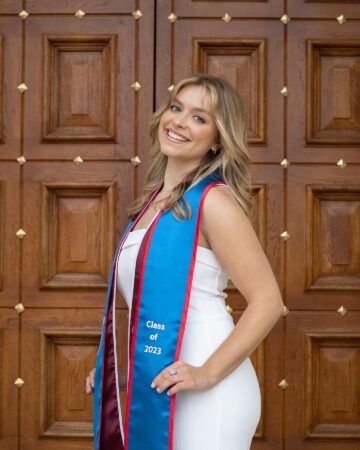
Gender roles, stereotypes, and expectations are so pervasive in our culture that it is often difficult to imagine a world without them. Gender reveal parties assume a child’s sex and gender are synonymous while reinforcing the idea that blue means boy, and pink means girl. Language quite literally shapes us and impacts how we think and see the world in terms of gender. Gender or sex is required on all sorts of forms and documents. For Claire Shepard ’23, a women’s and gender studies and communication studies double major, researching how LMU can be more inclusive and respectful of identity by removing these gender and identity barriers on forms and surveys served as the basis for her 60-page senior theses titled “What is your gender? A qualitative study on surveillance and the instability of gender categorization at LMU.”
“Even as a cisgendered person, I don’t experience gender on a binary,” said Shepard. “In fact, I don’t believe anyone truly experiences gender on the rigid binary we are socialized to accept.”
Shepard was asked to analyze the 2014 StudyLA annual Angeleno Poll as part of a research assistantship with Amanda Apgar, assistant professor of women’s and gender studies. The annual poll is the largest general social survey of any metropolitan area in urban America and provides a unique perspective into the quality-of-life perceptions, economic concerns, overall life satisfaction, and various civic issues facing Los Angeles residents. Shepard noticed that the gender question on the survey gave instruction in parenthesis for the interviewer to “mark best guess if respondent does not answer.” She coined this the “instruction to best guess,” and began to trace the ways the gender question was presented over the years from 2014-22.
In fall 2022, Shepard and Professor Apgar met with Brianne Gilbert, managing director of StudyLA, to discuss. “Ms. Gilbert was extremely open to having a conversation with us and was actually the one who proposed we revise the gender question for the 2023 Angeleno Poll,” said Shepard. Informed by research from her women’s and gender studies coursework, Shepard proposed removing the “instruction to best guess,” as well as including a write-in “other” option to account for the fluid ways that we as humans can experience gender. StudyLA enthusiastically agreed to incorporate Shepard’s suggestions and the 2023 survey was released with a new gender question.
Shepard’s deep dive into StudyLA’s surveys evolved into a more comprehensive project where she looked at the many different ways LMU’s internal programs and portals track gender, highlighting all differences and different emphases (sex, pronouns). In asking why LMU requires its students to disclose their gender identity at all, she turned to the work of French philosopher Michel Foucault to deeper understand some of his theories related to discipline and surveillance. Another dimension of this project included distributing her own survey to LMU community members, asking them to describe their gender without using sex or gender language. She received 28 responses of poems, songs, images, and extremely creative descriptions of non-man/woman/other ideas of gender.

“In giving the LMU community the space to describe their gender separate from the restrictions of the heteronormative gender binary, I saw gender potentiality and futurity like I never could have imagined,” said Shepard.
Shepard had the opportunity to present her research at LMU’s Undergraduate Research Symposium, at the LMU Women’s and Gender Studies Senior Symposium, and at the Center for the Study of Genders and Sexualities Conference at Cal State LA. “Getting to conduct my research and present it three times has been one of the highlights of my college career,” she said.
Shepard’s project received the Women’s and Gender Studies departmental award for excellent student work. “The project is stunning in its handling of high level theory (of gender and surveillance) and absolutely clear prose,” said Apgar. “We are beyond proud.”
Shepard, who is originally from San Ramon, California, decided to come to LMU after attending Preview Day. “Standing on the bluff and looking at the incredible view of LA, I knew I couldn’t leave, and it was the best decision I ever made,” she said.
In her second semester at LMU she enrolled in “WGST 1100: Gender, Race, and Sexuality in Contemporary Society” with Professor Apgar and absolutely fell in love with the course. Two months into the spring semester, the global pandemic hit, and the class became her lifeline. By the end of the semester, Professor Apgar helped Shepard declare a minor in women’s and gender studies, and by fall 2020 she decided to make it a major.
“Being a part of the Women’s and Gender Studies Department in the LMU Bellarmine College of Liberal Arts has been the most rewarding and memorable part of my college experience,” said Shepard. “As a feminist, I don’t believe I’ll ever stop critically analyzing the world around me and imagining a better future.”



